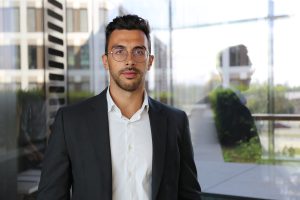Meet Carlos Bessa, our faculty alumnus. Carlos graduated in 2019 with a Master’s in Accounting and Audit, after completing his Bachelor’s in Economics at the University of Luxembourg in 2016. After graduation, he secured an internship with EY, one of the largest international accounting and professional services firms, as a Trainee Auditor. Carlos stayed with the company for over four years and was eventually promoted to Senior Auditor. It has been almost a year since he joined l’Administration des Contributions Directes (ACD) as an Economist. We asked Carlos to share insights into his academic journey and his current role at ACD, and to reflect upon his path from Uni.lu to public administration.
Carlos, you completed both your Bachelor’s and Master’s degrees at Uni. lu, and you also earned a supplementary certification for company auditors with us. What influenced your decision to pursue all these qualifications at Uni. lu?
Before attending university, I studied at a management school in Luxembourg. Continuing in economics felt like the natural path for me. After completing my Bachelor’s degree, I specialized in Audit and Accounting because I was always curious about accounting and numbers. The Master’s program at Uni.lu was a good fit due to its focus on these subjects and the local job market, which I knew would be beneficial for finding a job. After graduation, I worked for five years at EY, a Big Four audit firm. The IRE certificate was in line with my work and added further guidance and knowledge relevant to my work.
Did you have a favourite professor at Uni. lu or anyone who had a significant impact on you?
I can name two. First, Thomas Kaspereit: He was the head teacher of our master. He was always available and helped me during my studies. And then, Stephane Cousin, my audit teacher. He was always enthusiastic about his work and could transmit his passion to all the students. Which made me choose EY as an internship.
If you reflect on your Master’s studies, in what ways did they prepare you for your professional career?
My Master’s degree allowed me to have a solid foundation in financial reporting standards and auditing practices. Certainly, the programme improved my analytical skills, enabling me to assess complex financial data and identify risks effectively. It also emphasized ethical standards, ensuring I maintain integrity in my work. With various practical projects and case studies, I gained more experience that has been directly applicable to my work.
Can you walk us through a typical day or week in your role at the Administration des Contributions Directes? What are some of the key responsibilities and activities you handle?
In my role, I contribute to the implementation of the Pillar 2 / GloBE project, assisting in the drafting of legislative texts and circulars. I participate in both national and international working groups, maintain direct contact with taxpayers and their advisors, and work individually and in teams to resolve complex tax issues. Additionally, I provide backup support to colleagues within the economic division and collaborate closely with other divisions.
What advice would you give to current students or recent graduates who aspire to pursue a similar career? Are there specific steps or strategies you recommend?
My advice to aspiring professionals is to develop a solid foundation in their field of interest. Gaining practical experience is important for building skills and industry knowledge. Staying adaptable and continuously learning where regulations and technologies evolve will help ensure long-term career growth. Communication skills are also important, as you will need to explain complex concepts to clients or colleagues clearly. Cultivating attention to detail and critical thinking will also help solve problems efficiently.
